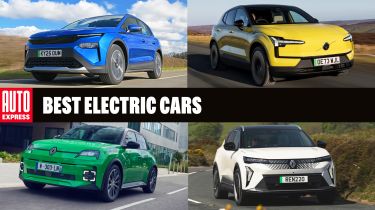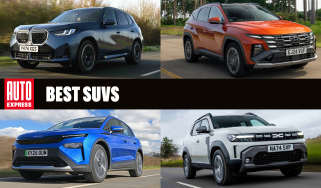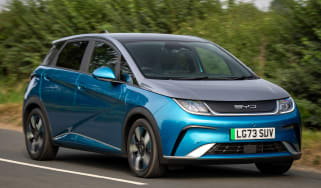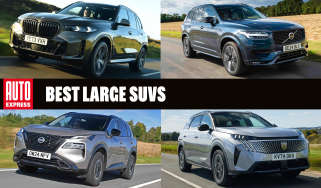Best electric cars 2025: the top 10 best EVs you can buy today
Thinking about making the switch to an electric vehicle? Here are the EVs that should be on your shortlist, and why…
Electric cars are no longer a niche choice – they now make up a quarter of new car sales in the UK and are only growing in popularity. With tighter emissions rules in major cities and the ban on the sale of new petrol and diesel cars approaching, more buyers are making the switch to electric and the question of which electric car is best has never been more relevant.
If you're considering an EV, you'll be wondering which of the many options suits you best. That very much depends on how you'll use the car and on this page you'll find our expert road test team’s opinion on the best electric cars for a range of use cases.
Our road testers have driven every new electric car available in the UK, comparing them all in real-world conditions to find out which models truly stand out from the pack. We assess everything from battery range and charging speed to price, practicality, and driving experience, ensuring you get a complete picture before making a buying decision.
A common concern in the past was range anxiety – the fear of running out of charge before reaching your destination. But with many modern EVs now offering over 300 miles of real-world range, and some tipping over the 400-mile mark, this is becoming far less of an issue. Electric car prices are coming down, too. There's now a great choice of new electric cars in the £20,000 to £30,000 price bracket with many priced at a similar level to petrol and hybrid counterparts.
Below, our list of the top 10 best electric cars on sale today covers a range of budgets and needs. Plus, at the end of the article, we’ll highlight key things to look out for when buying an electric vehicle. Let’s dive in and find the best electric car for you.
Compare the 10 best electric cars
You can compare the review star ratings for our top 10 EVs using the table below, along with the range, boot space and prices. Scroll down for the full story on each car...
| Rank | Car | Price from | Overall rating | Range | Efficiency | Boot space |
| 1 | Citroen e-C3 | £21,990 | 5.0 | 198 miles | 3.6 m/kWh | 310 litres |
| 2 | Skoda Elroq | £31,500 | 5.0 | 232-360 miles | 3.9 - 4.1 m/kWh | 470 litres |
| 3 | Kia EV3 | £32,995 | 4.5 | 267-372 miles | 4 - 4.2 m/kWh | 460 litres |
| 4 | Renault 5 E-Tech | £22,995 | 4.5 | 193-249 miles | 4.1 - 4.3 m/kWh | 326 litres |
| 5 | Hyundai Kona Electric | £32,995 | 4.5 | 234-319 miles | 3.7 - 4.3 m/kWh | 466 litres |
| 6 | Renault Scenic | £37,500 | 4.5 | 260-379 miles | 3.5 - 3.6 m/kWh | 545 litres |
| 7 | Volvo EX30 | £33,050 | 4.5 | 214-296 miles | 3.4 - 3.7 m/kWh | 318 litres |
| 8 | Tesla Model 3 | £39,980 | 4.5 | 318-436 miles | 4.4 - 5 m/kWh | 594 litres |
| 9 | BMW i4 | £51,860 | 4.5 | 311-373 miles | 3.5 - 4 m/kWh | 470 litres |
| 10 | Leapmotor T03 | £15,995 | 4 | 165 miles | 3.8 m/kWh | 210 litres |
1. Citroen e-C3
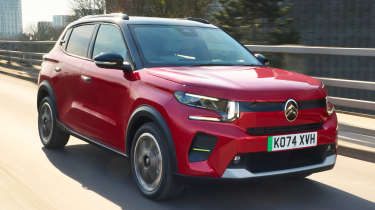
- Prices from £22,000
- Auto Express Car of the Year 2024
Pros |
Cons |
| Soothing ride comfort that shames many larger cars | Efficiency takes a hit on the motorway |
| Very keenly priced – a small EV for petrol supermini money | High-pitched whine from the motor can be annoying |
| Spacious cabin, even for rear-seat occupants | Wind noise at higher speeds |
One of the biggest hurdles between potential buyers and the switch to an electric car is the price. Rather than pumping its electric supermini full of unnecessary and costly bells and whistles, Citroen has simply made the e-C3 into a sensible little car that comes with the kit that you’ll actually need, at a price that many can realistically afford.
There are cheaper electric cars, like the Dacia Spring and Leapmotor T03, but they’re no match the Citroen e-C3 when it comes to practicality, battery range or equipment. It’s an excellent package at a very reasonable price, and that’s exactly why the Citroen e-C3 was named our 2024 Car of the Year.
With an official range of up to 199 miles per charge, the e-C3 is surprisingly capable at taking on family car duties. We averaged 3.5 miles per kWh on our test for a real world range of 153 miles, but staying off the motorways saw this rise to an excellent 5.0mi/kWh or 220 miles. That’s very close to the range we achieved in the Renault 5, which has a larger battery and less space inside.
Citroen has avoided the trend for sporty handling, instead making the e-C3 ride and steer in a relaxed way that’s unusual for a car so small, this approach is enhanced further by the squashy ‘Advanced Comfort’ seats. The tradeoff is that you’ll not find much fun in the corners, but the light steering makes town driving very easy indeed. Performance is modest for an EV, but more than a match for petrol superminis at similar money.
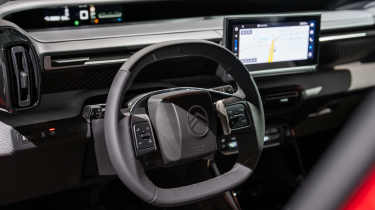
Despite the low pricing the e-C3’s cabin doesn’t feel pared-back to the bone – there’s a bit of design flair in the horizontal dashboard layout with its fabric trim elements, and an impressive amount of cabin space for its size, especially in the rear seats, compared to the cramped layout of some small EV rivals.
“The e-C3 is the first usable, small electric car that’s the same price as petrol-powered alternatives without presenting any obvious compromises” – Alex Ingram, chief reviewer, who road tested the e-C3 in the UK
Alternatives to the Citroen e-C3 include the other models on our best small electric cars list, including the cheap and cheerful Dacia Spring, and the Leapmotor T03. The Citroen beats both for comfort and practicality, though. Those looking for a bit more style and fun at the wheel might consider the electric MINI Cooper or Renault 5.
2. Skoda Elroq
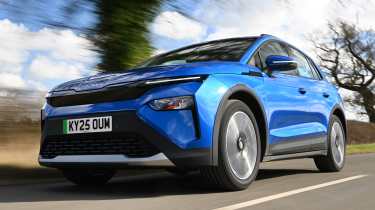
- Prices from £31,500
- Best for families
Pros |
Cons |
| Supremely comfortable | OK range for base model |
| Spacious, sophisticated and functional interior | No physical climate controls |
| Skoda’s ‘Simply Clever’ features | Average standard warranty |
Skoda doesn’t tend to miss the mark when it launches new cars, and the Elroq, a small electric SUV competing with the likes of the Renault Scenic, Kia EV3, and Hyundai Kona Electric, is the latest car the Czech marque has got pretty much spot on.
The styling’s a little odd – it’ll take a little while before the new grille-less front end starts looking like a Skoda to us – but a sophisticated cabin, quick charging speeds (up to 175kW), and competitive pricing (it starts from under £32,000) make the Elroq one of our favourite EVs on sale and the top choice for young families.
It’s a sign of Skoda understanding its buyers that the Elroq drives almost exactly as you’d hope a family SUV would drive. It feels substantial but not unwieldy, has a mature ride quality but doesn’t loll around in corners, and it’s very easy to meter out as much or little electric power as you need at any speed. Even on the maximum setting, the brake energy regeneration system doesn’t quite offer one-pedal driving, so you’ll need to use the brake but it’s still easy to manage.
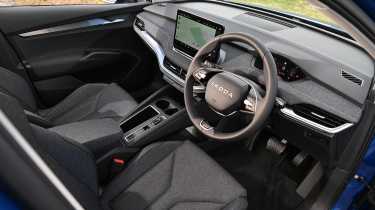
The Elroq’s interior is smart and modern. A few too many controls are buried within the touchscreen – a Renault Megane or Scenic is a little easier to interact with on the move – but the screen is otherwise very intuitive. There’s loads of room front and rear too, with large thigh cushions for the rear seat passengers to account for the higher floor, and a decent 470-litre boot.
“The Elroq is so good that we see it creating a bit of a dilemma for Skoda: why would anybody need the larger Enyaq now?” – Ellis Hyde, news reporter, who tested the Elroq in the UK
Alternatives to the Elroq include the Kia EV3 which offers slightly better range, and the Renault Scenic with its slick infotainment system. Ford’s Explorer is strong on comfort but none are quite as well-rounded as the Skoda. You’ll find more options in our best electric SUVs list.
3. Kia EV3
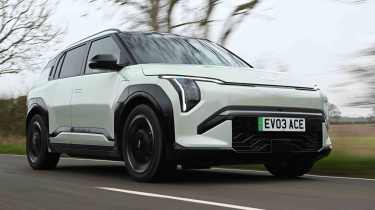
- Prices from £33,000
Pros |
Cons |
| A big battery means huge range | Not fun to drive |
| Large, practical boot | Rear-seat comfort |
| Comfortable ride at all speeds | Heat pump on top model only |
Kia has really understood the assignment with electric cars. The Niro offered plenty of range at a good price, the EV6 looked great and really stepped up the brand’s performance game, the EV9 is hugely impressive (and hugely huge), and the new EV3 is like a scaled-down EV9, yet despite its compact size, offers up to 372 miles of range. It’s more of the same from the Korean brand and we really like it.
The EV3 doesn’t offer the slightly mad performance you’ll get from the similarly-sized Volvo EX30, but 0-62mph times in the seven-second range are plenty for a family hatch, and different driving modes let you tailor the electric motor’s response to your tastes.
What the modes don’t do is make the EV3 fun to drive, and the soft suspension can sometimes struggle with the Kia’s weight – but the rest of the time, most drivers will appreciate the fairly relaxed ride quality (on the motorway especially), impressive refinement, and several levels of braking regeneration, from coasting to one-pedal driving.
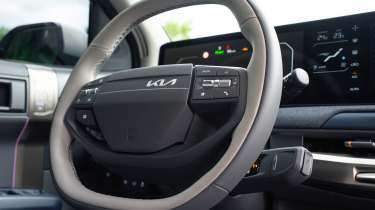
The boxy looks imply huge cabin space but it isn’t quite as commodious as you’d expect, partly thanks to a high floor that pushes rear passengers’ legs upwards and leaves them short of thigh support. Those in the front are unlikely to complain with the logical and uncluttered dash. The 460-litre boot is a pretty good size for the class, too.
“Kia’s new compact electric SUV offers a long range, a practical boot, and good passenger comfort in a stylish package” – Alex Ingram, chief reviewer, who road tested the EV3 in the UK
Alternatives to the EV3 include the Hyundai Kona which uses similar technology but is a little sharper-looking. The Skoda Elroq, Renault Scenic and Ford Explorer are a little roomier for rear-seat passengers. Range is a strength of the Kia, although it takes over 400 miles to make the current list of the longest range electric cars.
4. Renault 5
- Prices from £23,000
- Best for retro style
Pros |
Cons |
| Great to drive in all conditions | Slightly bouncy ride at lower speeds |
| Keen pricing for an electric car | Drive selector position is a bit fiddly |
| Lots of user-friendly in-car tech | A high boot lip to load items over |
The Renault 5 electric supermini is a brilliant fusion of retro design and everyday practicality. It takes design cues from the classic 1970s original, but is also a thoroughly modern design, packed with neat touches yet also very fairly priced, starting from around £23,000.
With a 148bhp motor and the option of a 40kWh or 52kWh battery, it officially provides up to 252 miles of quoted range and can hit 0-62mph in just eight seconds. It’s one of the most desirable small cars in years, and brings a winning combination of style, technology, and driving enjoyment to its segment.
The Renaut 5 is a pleasure to drive, offering a smooth, comfortable ride that feels right at home on city streets. The handling is responsive and agile, with just enough sportiness to keep things fun through corners. The suspension works hard to smooth out rough roads, providing a ride that’s both comfortable and confident. Real-world efficiency suffers a little at speed, but you should be able to get 200 miles on a charge in the larger-battery version.
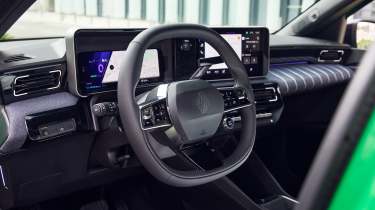
Space is another plus point for the Renault 5, with its 400-litre boot trumping many small EV competitors, including the MINI Cooper E. Rear doors make daily use even more convenient, while the seats inspired by those from the classic Renault 5 Turbo offer excellent comfort on long journeys.
Inside, it strikes a balance between nostalgia and modern tech. The Google-based infotainment system is intuitive, updatable and loaded with useful features.
“The Renault 5 plays heavily on nostalgia and there’s so much joy in this little package that it’s impossible not to be impressed” – Jordan Katsianis, senior staff writer, who tested the Renault 5 on its international launch in France
The styling of the Renault 5 is going to attract a lot of customers and those same buyers will be looking at the Fiat 500e, which isn’t as fun to drive, and the electric MINI Cooper, which isn’t as spacious inside. Our lists of the best small electric cars and the cheapest electric cars will give you some more options.
5. Hyundai Kona Electric
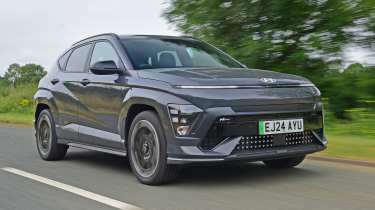
- Prices from £33,000
Pros |
Cons |
| Easily handles long commutes and road trips without frequent charging | Prioritises comfort over sporty handling |
| Plenty of room for passengers and cargo, making it great for families | Bold styling won’t appeal to everyone |
| Premium materials and a refined cabin create a comfortable driving experience | Higher trims push prices into premium EV territory |
The Mk2 Hyundai Kona is our favourite small SUV on sale right now, not to mention a previous Auto Express Car of the Year title holder. However, it’s the Kona Electric which is the most mature and well rounded car of the range, from its road manners to the interior. Every Kona Electric sold in the UK comes with an efficiency-boosting heat pump fitted as standard, too.
The original Kona was already a hit with customers, but the model was a bit constrictive in terms of size. Now, though, the new car sits on the same platform as the Kia Niro, so there’s more space on offer along with a whole suite of improvements including a much bolder new look, upgraded on-board technology and higher-quality materials.
For those who want to cover more miles, the Long Range model’s larger 65kWh battery boosts the range to 319 miles. Rapid-charging capabilities aren’t as groundbreaking as Hyundai’s Ioniq 5, but a 10-80 per cent top-up takes less than 45 minutes.
There’s enough performance for easy overtaking while light steering makes the Kona easy to drive in town, while it feels steady enough to make light work of motorway cruising too. Just don’t expect any fun on B-roads.
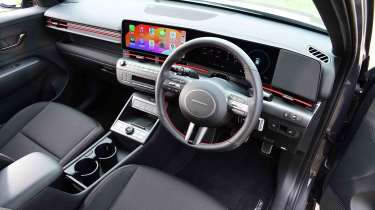
Step inside and the dashboard is now dominated by two 12.3-inch screens that run on brand-new software. Hyundai hasn’t shied away from physical controls, though, as there are still buttons for systems such as the climate control and radio.
“The entry-level version with the smaller battery is temptingly affordable, while the larger battery offers up to 319 miles of range from a full charge” – Alastair Crooks, staff writer, who tested the Kona Electric in the UK
The electric Kona isn’t as fresh faced as it once was, a fact highlighted by the arrival of the Kia EV3 using similar tech. Other options outside this top 10 include the more stylish Ford Explorer, and the comfortable Citroen e-C4 but the Kona is a better all-rounder than either.
6. Renault Scenic
- Prices from £37,500
Pros |
Cons |
| Sharp exterior design | Poor rear visibility |
| Decent boot space | Firm ride won’t be to all tastes |
| Good value for money | Limited rear foot space |
The Renault Scenic draws plenty from the smaller Renault Megane, and that’s a good thing as the Megane is a talented and good-looking small family car, and with the Scenic you’re getting all that plus extra space – albeit in an SUV-style form factor, rather than the Scenic’s heritage as an MPV.
With 60kWh and 87kWh battery options you get range estimates of 260 and a useful 379 miles - the latter being pretty competitive, especially given the Scenic is good value for this class: pricing spans £37,500 to £45,500, with some affordable finance deals around.
There’s a drawback to the Scenic’s stylish 20-inch wheels and that’s a slightly firm ride that not all family buyers will appreciate, and the tyres also create some road noise. But the firmness also helps control the car’s weight, and while it’s not sporty to drive, quick steering helps it feel responsive.
168bhp and 217bhp power options are more than enough to get the Scenic moving, and they’re tied to the two battery options, so you also get more range from the more powerful car, as well as a higher 105mph top speed, should you need it.
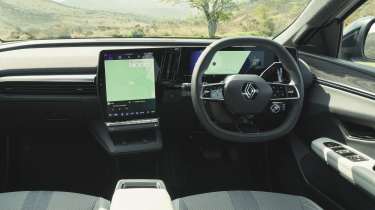
The Scenic’s interior design is lifted almost wholesale from the Megane, which is no bad thing. It feels fresh and modern but not over-designed, and packs some of the most straightforward, usable tech you’ll find in this class. Infotainment is Google-based, while Renault makes it easier than just about anyone else to turn off unwanted driver assistance features with its ‘My Perso’ button.
Quality’s pretty good too, with tactile seat material made from recycled plastics, while a wheelbase 10cm longer than the Megane and a wider track liberates a lot more interior space. A high floor pushes up rear passengers’ feet, but the 545-litre boot is a useful size.
“Competitive pricing and generous equipment mean the Scenic offers good value for money when compared with its rivals, even in top-spec Iconic guise” – Dean Gibson, senior test editor, who road tested the Explorer in the UK
The Scenic out-classed the Ford Explorer in our twin-test of the two cars, although those prioritising ride comfort may prefer the Ford. Other alternatives include the roomy Skoda Enyaq and the Kia EV6, though the Scenic’s interior and technology beat both.
7. Volvo EX30
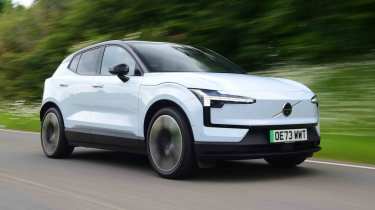
- Prices from £33,000
Pros |
Cons |
| One of the best-value premium EVs | Physical buttons for key functions would improve usability |
| Sharp handling and quick acceleration make it enjoyable to drive | Higher insurance costs than some rivals |
| High-quality interior with premium materials and sleek design | Standard warranty isn’t as strong as competitors |
The Volvo EX30 is a bit of a weird car, but please hear us out. It wears a premium badge, it’s an electric SUV, it’s well built, well kitted-out, great to drive and can return up to 295 miles on a single charge. So far so good, but now here comes the unusual bit: you can pick one up brand-new for under £35,000. That makes this Volvo one of the cheaper brand-new EVs on the UK market, as well as one of the best.
In Performance trim the EX30 is one of the quickest-accelerating cars on the road – though its 422bhp is probably overkill for a sensible family crossover. More useful is that all versions of the EX30 are surefooted and the chassis has a sophisticated feel, especially at motorway speeds. Of course, it’s also very refined, with only a rustle of wind when you’re driving faster to disturb the peace.
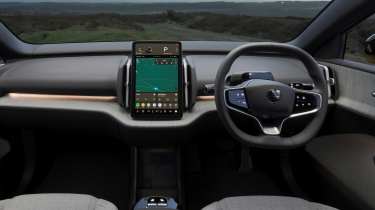
There are a number of fully-electric models that undercut the EX30’s price, but very few of these match the EX30’s size and practicality. Fewer still can match the level of quality on offer, and the minimalist design looks smart. We just wish it was a bit less reliant on its touchscreen to control basic functions – almost all minor controls are operated using the screen, which can be downright irritating on the move.
“The Performance model is an intriguing hot hatch alternative for those who prefer to fly under the radar” – Alex Ingram, chief reviewer, who road tested the EX30 in the UK
The EX30’s value price makes it a more compelling option than mainstream EVs like the Skoda Elroq if you really want that premium badge. The Renault Megane’s infotainment is easier to use and the Cupra Born’s sporty design appeal but the performance of the little Volvo gives it an edge.
8. Tesla Model 3
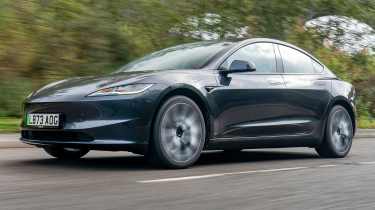
- Prices from £40,000
- Best for range and charging
Pros |
Cons |
| Excellent real-world range | No indicator stalks: Steering-wheel buttons may frustrate some drivers |
| Quick acceleration and sharp handling, especially in Performance trim | Rivals can be more engaging to drive |
| Tesla has refined materials and fit-and-finish over previous models | No Apple CarPlay or Android Auto: Infotainment relies entirely on Tesla’s system |
With its long range, mind-boggling performance and minimalist, hi-tech cabin, it’s not hard to understand why the Tesla Model 3 has been such a hit since it landed in 2019. In fact you’ll struggle to not stumble across a dozen Model 3s wherever you go in Britain these days.
The Model 3’s midlife facelift only added to its appeal by increasing the official battery range – up to 319 miles for the entry-level rear-drive model – while new acoustic glass, quieter tyres and sound-deadening materials boosted the level of refinement.
High performance has always been a Tesla hallmark and the Model 3 delivers here too. Even the 245bhp base model is brisk with a 5.8-second 0-62mph time, while the Model 3 Performance makes 460bhp and gets from 0-62mph in 2.9 seconds. It’s got good cross-country pace and a firm but controlled ride, though we’d struggle to call it a driver’s car.
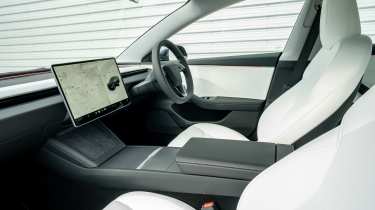
The centrepiece of the Model 3’s cabin is a large 15.4-inch touchscreen, which was given more usable screen area in the most recent updates, while the interior and build quality are also better than in early cars. One controversial element is the lack of indicator stalks, which have been replaced by steering-wheel buttons that we found awkward to use.
“As long as you’re not intimidated by the cutting-edge technology or the minimalist interior, the Tesla Model 3 is a great option” – Ellis Hyde, news reporter, who tested the Model 3 in the UK
Alternatives to the Tesla Model 3, like the Volkswagen ID.7 or BMW’s i4, still struggle to match its charging speeds and technology. It’s up with the fastest charging electric cars you can buy and the Supercharger network gives it a further edge.
9. BMW i4
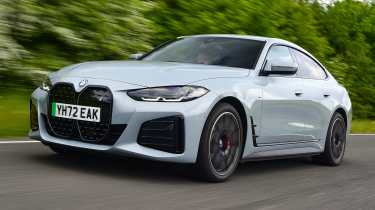
- Prices from £52,000
- Best for driving experience
Pros |
Cons |
| Exceptional build quality | Pricier than some key rivals |
| Sharp handling, precise steering, and excellent grip | Less rear legroom compared to some competitors |
| Advanced infotainment and driver assistance features | Four-star Euro NCAP safety rating when rivals have five |
The BMW i4 has been around since 2021, so it’s getting on a bit as electric cars go – but the fact it’s still one of our favourite EVs shows how right BMW got it to start with. It’s a proper BMW that just happens to be electric, with the same qualities as BMW has offered for decades, and range and performance that are both still very competitive in this market.
The BMW i4 is a great example of why keen drivers needn’t be concerned about an all-electric future. Despite weighing more than two tonnes, the i4 is superb through the corners with lots of grip, a precise steering feel and no understeer.
The rear-wheel-drive models produce between 282bhp and 335bhp, and offer up to 365 miles of range, while the i4 M50 gets a dual-motor set-up for all-wheel drive, plus a highly potent maximum output of 536bhp and 795Nm of torque. Ride comfort and noise levels are also both excellent, adding to i4’s appeal as a superb all-rounder.
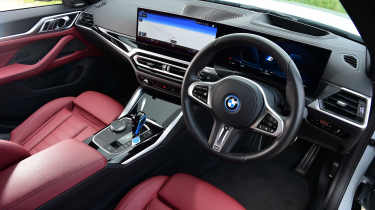
It’s not only in the bends that the i4 impresses; the cabin oozes quality and is packed with the latest on-board technology. The layout is similar to that of the petrol BMW 3 Series and none the worse for it, and while rear-seat space is a little tight, the hatchback layout makes for easy access to the 470-litre boot.
“Buyers can rest assured that none of the company’s driver-focused DNA has been lost in translation to electric power” – Ellis Hyde, news reporter, who tested the i4 on UK roads
Volkswagen’s ID.7 is a roomy and relaxing alternative but it lacks the BMW i4’s prestige and poise on the road. The Tesla Model 3 won our megatest of electric company cars, putting the i4 in second place but it too can’t match the BMW as the driver’s choice in the sector. Best for low costs
10. Leapmotor T03
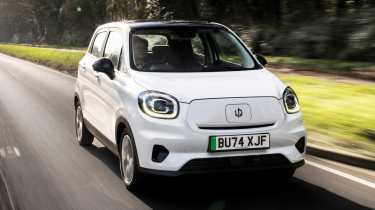
- Prices from £16,000
- Best for low costs
Pros |
Cons |
| Plenty of rear seat interior space for a city car | Tiny boot and one-piece folding back seat impact practicality |
| Lots of equipment as standard | Bouncy ride quality compared with more accomplished rivals |
| Represents good value compared with rivals | Some cheap-feeling interior materials |
If you’ve never heard of a Leapmotor T03, you will be far from the only one. But if you’re in the market for an affordable EV, you’ll be glad that this Chinese city car has now crossed your path.
The big selling point here is the price. At under £16,000, the T03 is one of the cheapest new cars on sale of any kind. That this is a fully electric car, with a 37.3kWh battery and a 165-mile official range, makes the price even more impressive. The 45kW claimed maximum charging speed enables a 30 to 80 percent top-up in about 30 minutes - better than the Dacia Spring.
We have to limit our driving experience expectations for EVs at this price point. The ride is a bit too bouncy, particularly on rough surfaces, so the likes of the Fiat 500e and Renault 5 are much more fun and composed to travel in. 0-62mph performance of 12.7s is also sluggish for an electric car.

Things improve markedly inside where you get a surprising amount of rear legroom for a car of this type, a lot more than in a Fiat 500e. Just be aware that there are only four seats so there’s no chance of squeezing in a fifth passenger and that the boot is small with no cable storage. While some of the materials are a little low rent, the cabin is of decent quality, has good storage options and is very well equipped.
“Sure, there’s hard, scratchy plastic on the dash and doors, but it all feels well put together. The usual touch points are covered in higher-quality materials…” - Max Adams, online reviews editor, who tested the car in the UK.
The obvious alternative to the Leapmotor T03 is the Dacia Spring, which is a little cheaper but feels a less well-rounded product overall. The T03 is better equipped and more spacious for passengers and charges faster. There are small EV city cars that feel more polished but they all cost a lot more, too.
More great electric cars to consider...
It's becoming harder and harder to make it into our best electric cars top 10 but there are some great alternative EVs out there that didn't quite make the cut...
Small, affordable EVs
These are the city car, supermini and family hatch sized cars that didn't quite make our top ten but are worth a look. You can learn more on our best small electric cars and cheapest electric cars pages.

- Dacia Spring: A super-low cost EV that’s brilliantly easy to use. It does feel cheap in places though.
- Fiat 500e: Always a solid style choice, the Fiat 500e is also a very practical electric city car.
- MG4: a great value EV with fast charging and a well-judged driving experience. Interior quality could be better.
- Cupra Born: The Born looks and drives in a sporty fashion well beyond what you get from its VW ID.3 sister car. The controls can be a bit tricky to fathom.
Family-size EVs
These electric cars are big enough for a family but not quite good enough for our top 10 best EVs overall. You can find more top family-sized EVs on our best electric SUVs page.
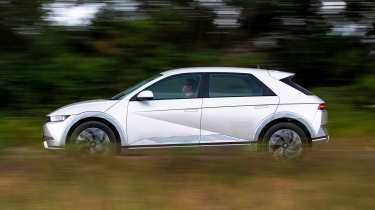
- Hyundai Ioniq 5: Distinctive retro-futuristic styling combined with Hyundai’s top class EV tech and a roomy cabin make it a fine choice.
- Kia EV9: The do-it-all family EV, Kia’s big MPV is a fantastic option for those who need loads of space and comfort.
- Skoda Enyaq: Skoda’s sensible Enyaq has lots of space and a good range. A fine EV for the larger family.
- Kia EV6: The sleek EV6 doesn’t drive quite as well as the looks suggest but it has few weak spots otherwise.
- Ford Explorer: Based on VW EV tech but feeling like a classier proposition in many respects, the Explorer is comfortable and quiet on the road.
- Citroen e-C4: Attractive pricing and good real-world efficiency give the e_C4 and edge. Plus there’s a higher-riding e-C4 X to consider.
- Volkswagen ID.7: The electric equivalent of the much-loved Passat family car, the ID.7 is comfortable and very well equipped.
Premium and executive EVs
There are some excellent EVs at the top end of the market with advanced tech and premium badges. These are some great options that didn't quite make our top 10. Find more on our fastest charging electric cars and longest range electric cars pages.
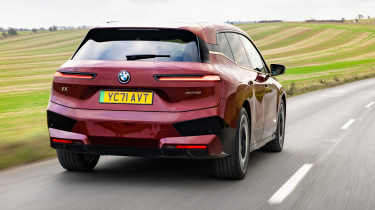
- BMW i5: A real classy customer, the i5 is a formidable electric executive car. It’s great over long distances and has a slick infotainment system.
- BMW iX: The BMW iX has a great interior with space and technology in abundance. It’s really good to drive as well, despite the weight.
- Porsche Macan: Porsche's mid-size SUV drives like a hot hatch but piles on the practicality and has a slick EV powertrain.
How much tax do you pay on electric cars?
As of April 2025, you have to pay VED road tax on new electric cars. There’s a cheap first year rate of £10 but after that it’s £195 per year like most other cars. There are now plenty of EVs that dip under the £40,000 price bracket where the ‘expensive car supplement’ is payable, however. On company car tax, electric cars are still the cheapest option in town, although costs are rising. Read more on low tax cars, and electric car tax in general.
How we choose the best electric cars
Here at Auto Express our extensive road testing programme continues to examine every new car on sale in detail, so it’s only natural that an ever-increasing proportion of those cars are EVs.
Just as with petrol, diesel, hybrid and plug-in hybrid cars, we test every aspect of the electric vehicle’s make-up but with pure electric models we pay particular attention to these areas. And so should you when taking your test drive.
Here are some key things that we look for in a great electric car...
- Long real-world driving range in warm and cold weather
- Fast charging speeds
- Good regenerative braking system with natural responses
- Infotainment system features to find and manage charging
- Good charging cable storage
Beyond that, we test the same things we look for on any car, from the driving experience to the infotainment system and the practicality of the interior. All are carefully evaluated by our experts to determine exactly where the car sits in relation to similar models that you might be considering.
We also know that price is a huge factor for EV buyers, with 52% of our readers telling us that finding the best deal is the most important part of the car buying process for them, so our experts also analyse the market to carefully compare the prices, plus the leasing and finance deals, of each model when rating the electric cars. All-in-all, our extensive testing process is designed to bring you the definitive verdict on the best electric cars to buy.
How much is tax on electric cars?
As of April 2025, you have to pay VED road tax on new electric cars. There’s a cheap first year rate of £10 but after that it’s £195 per year like most other cars. There are now plenty of EVs that dip under the £40,000 price bracket where the ‘expensive car supplement’ is payable, however. On company car tax, electric cars are still the cheapest option in town, although costs are rising. Read more on low tax cars, and electric car tax in general.
How to choose the best electric car for you
Switching to an electric car is easier than ever, with more models available, longer driving ranges, improved charging infrastructure and lower prices. However, the question of which EV is best for you depends on your lifestyle, driving habits, and budget. Here’s are the key things to consider:
1. Will an EV fit your lifestyle?
Electric cars still work best for drivers who can charge at home or work, but growing public charging networks do make them a viable option for those who can’t. If you mostly drive short distances and can access cheap and convenient charging, an EV could be ideal.
Long-distance drivers should check charging station availability along their usual routes and be conscious of the added cost associated with charging away from home.
2. Balancing purchase price & running costs
EVs can have higher upfront costs than petrol or diesel cars but the gap is closing. Running costs, meanwhile, have long been significantly lower. Charging at home is cheaper than refuelling with petrol although the most expensive public rapid chargers can be no cheaper than fuelling an ICE car.
Maintenance costs are reduced due to fewer moving parts and reliability should be good. EV batteries are expensive to replace but have long warranties and should outlast the typical life of the car. Company car drivers also benefit from tax incentives.

3. Practicality & interior space
Modern electric cars are designed with practicality in mind. Most now use dedicated EV platforms, optimizing passenger and boot space without the compromises seen in early EVs that were converted from ICE cars. Whether you need a compact city car or a spacious family SUV, there’s likely to be an electric model that meets your needs. EVs actually suit the SUV shape because the higher seating position leaves room under the floor for the batteries.
4. The driving experience
EVs offer instant torque, smooth acceleration, and a quieter experience compared to petrol and diesel cars. Many come with regenerative braking that slows that car when you release the accelerator, allowing for one-pedal driving in stop-start traffic. It all makes urban commuting more efficient and less stressful. Many EVs can outpace sports cars when accelerating from a standstill - even some quite innocuous looking ones dip under 5 seconds for the 0-62mph sprint.
5. Charging & range considerations
Most new EVs offer over 300 miles of range, with some exceeding 400 miles. Rapid charging stations allow for quick top-ups where you can add 100 miles of driving in 10 or 20 minutes. Home charging overnight remains the most cost-effective way to refuel as an EV-specific electricity tariff can deliver very cheap electricity at these off-peak times. Checking the real-world range and charging speeds for your preferred EV model is crucial to ensure it meets your daily needs.
With the EV market expanding and costs gradually decreasing, there’s never been a better time to consider making the switch. Whether you're looking for an affordable city EV or a long-range family car, the right electric vehicle is out there for you.
Frequently Asked Questions
Electric cars have zero exhaust or tailpipe emissions so they don’t produce the localised NOx and particulate emissions that have a damaging effect on air quality in urban areas. However, the overall environmental credentials of an electric car depend greatly on the source of the electricity used to charge it. As the energy mix of the National Grid moves towards renewable sources like solar, wind and tidal power and away from fossil fuels, electric cars get greener. Green NCAP has published whole life emissions estimates for various cars with small electric vehicles performing better than any ICE cars.
There's more information to help you make your electric car choices in our full guide to living with an EV...
